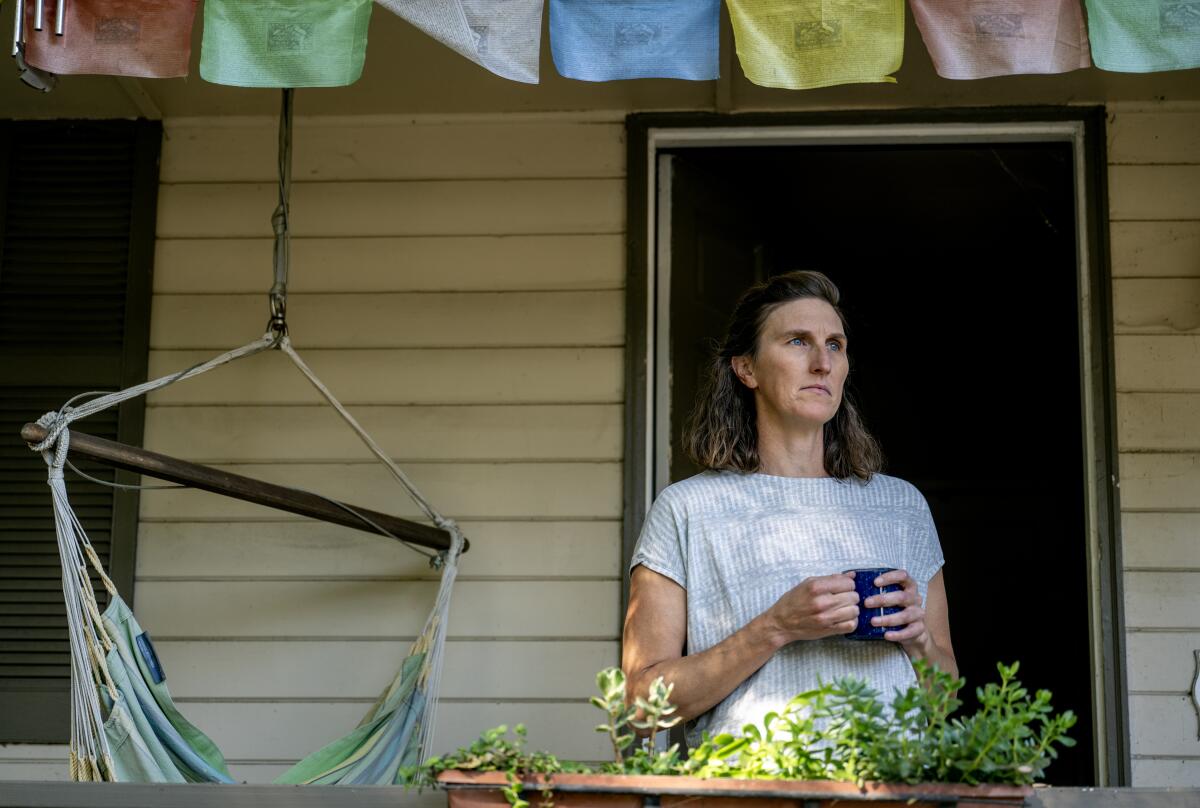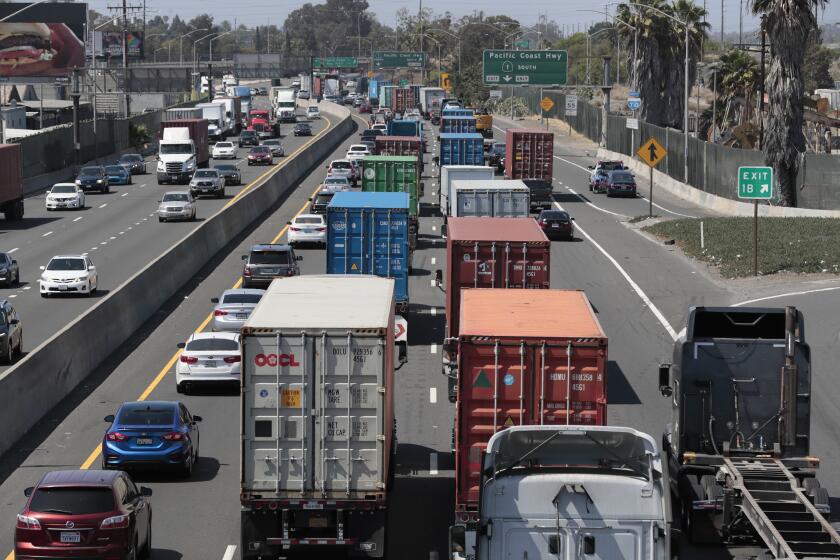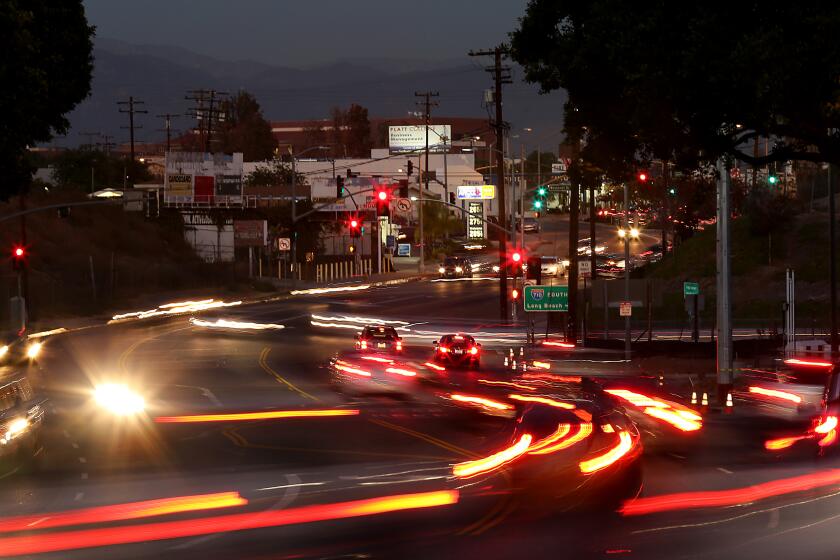A Caltrans executive questioned a freeway expansion. Then she was demoted

- Share via
For years, a California Department of Transportation executive, Jeanie Ward-Waller, said she asked tough questions about multimillion-dollar road projects at meetings where she was often the only woman.
Male bosses criticized her for being too emotional or aggressive, she said in interviews with The Times over the last two weeks. But Ward-Waller swallowed it, seeing it as part of her job to push forward an agency undergoing seismic shifts.
This summer, as the deputy director of planning and modal programs, Ward-Waller began raising questions about a $280-million repaving project along a stretch of Interstate 80. Ward-Waller became increasingly concerned the project was surreptitiously widening 3½ miles of the freeway — at the same time top state officials were pledging to end traffic-inducing freeway expansions to help meet ambitious climate goals.
Under state law, such projects require environmental review and public airing, but this plan had none of it, she said — and it tapped funds set aside for maintenance. It happened to be along the same 20-mile corridor of I-80 from West Sacramento through Davis where a partially federal-funded freeway lane is being proposed.
The funding for that corridor was competitive to get, and Caltrans could lose it if the project was not done quickly, she said.
She suspected the repavement project was intended to jump-start the corridor work by adding space for a new lane while bypassing the environmental analysis normally required for a freeway expansion.
In meeting after meeting, she raised concerns. But she said she was brushed off by transportation officials.
Finally, she complained to her supervisor, Caltrans’ Chief Deputy Director Mike Keever.
“I said, you know, ‘I feel like we’re lying to the public. We’re breaking laws. This is a huge concern to me and I also have major concerns about accountability,’” she recounted.
She said she told him she was thinking of filing a whistleblower complaint with the state auditor. A complaint could trigger an investigation.
Weeks later, she said, Keever called her into the office across the street from the Capitol to inform her that she was terminated from her position, with no explanation. A letter reviewed by The Times shows she was placed on informal leave and offered a lesser role, as required by state rules, at reduced pay.
“I was just totally shocked,” she said. “I didn’t think that I had like crossed a line or done anything wrong.”
Her attorney called her demotion an attempt to “chill whistleblowing content.”
“The message that Caltrans is sending to everybody else who has similar concerns within the department, is that there’s nobody too high to break down,” said her attorney, Christian Schreiber.
Ward-Waller filed a whistleblower complaint, first reported by Politico, with the state auditor Sept. 15. It detailed her objections over the project that she had shared with Keever and accused the agency of retaliating against her for making them.
In the complaint, reviewed by The Times, she said Caltrans District 3, which covers the state capital and oversees the projects she complained about, is well known inside the agency “to bypass and bend these rules and others regularly when it suits them to build more, bigger and faster projects.”
The auditor’s office will not confirm if the complaint was made.
Caltrans spokesperson Edward Barrera said in a statement: “Caltrans takes the allegations seriously and will cooperate with any independent investigation into these claims. In addition, Caltrans does not comment on personnel matters.”
The Times sent emails to Keever, Caltrans Director Tony Tavares and District 3 Director Amarjeet S. Benipal, and tried to reach them by phone, but did not get a response.
The accusations comes at a prickly time for Caltrans, under pressure to carry out Gov. Gavin Newsom’s climate goals while also continuing to push ahead on planned road projects that some environmental advocates see as undermining those efforts.
Caltrans was created to build freeways. For decades those sprawling roads were seen as a sign of progress, even as they exacerbated economic burdens through a reliance on costly vehicles, undermined cleaner and cheaper public transit and divided communities, particularly Black and Latino ones.
The agency is now grappling with its legacy, under the pall of deeply rooted inequity and a warming planet. Transportation is the largest contributor to California’s greenhouse gas emissions and studies have shown adding lanes increases vehicle dependence, while doing little to reduce congestion.
California transportation leaders want to wind down freeway widenings, but organized labor groups say road projects should continue.
In a watershed moment last year, Caltrans dropped a $6 billion expansion of the 710 Freeway that environmental and social justice activists said would add to pollution in Long Beach and the surrounding area.
California Transportation Secretary Toks Omishakin told The Times last year the state will no longer add freeway lanes solely to allow more cars and trucks to use them. The new policy is to look toward alternatives such as bus lanes, transit and bicycle routes.
But environmental advocates have complained that despite California’s official line, the $20-billion agency continues to push ahead on expansion projects — sometimes by lumping them into other smaller projects.
“This is classic Caltrans,” said Stephen M. Wheeler, a professor of urban planning and design at UC Davis, who has followed development along the I-80 corridor. “Caltrans has a long history of plowing ahead and widening roads without regard to various better policy alternatives. It has done that in many different ways, including by breaking projects up into small pieces, which makes it easier to get it approved and avoid public scrutiny. “
In Southern California, Streets for All founder Michael Schneider points to a series of auxiliary lanes less than a mile long that are being added to the 405 Freeway. Those lanes, he said, add capacity but aren’t considered new lanes and don’t undergo environmental analysis.
Ward-Waller said in the complaint she believes District 3 has employed a playbook similar to the I-80 with other projects, including work along the Capital City Freeway over the American River in Sacramento.
“There’s a culture of wanting to build more, and get it done quickly, despite the policy direction that sort of forces us to take a deeper look at the public benefits of those projects,” she said in an interview.
Ward-Waller said she felt there was a general frustration with female leaders pushing for change, some of whom came into the agency like her, looking to support environmental or social justice goals.
About three quarters of the 22,000-person agency is male and many she came into contact with were career employees who have been with the agency for decades.
“There’s a culture of patriarchy there,” she said. “Being in meetings with lots of men who don’t hesitate to speak strongly or talk over each other or kind of bully each other ... I would try to hold my own in those meetings. And I would not not allow myself to be talked over or cowed by that kind of behavior. But then, the criticism that I would then get from people above me is, ‘Oh, you’re too aggressive or you’re too emotional, or you got flustered.’”
Martin Greenstein, a spokesman for the California State Transportation Agency, which oversees the state’s roads, trains and water transportation systems, did not address Ward-Waller’s complaint, but defended Caltrans. He said California has been moving away from expanding freeways to create a “cleaner, safer, more connected and equitable transportation system.”
“Caltrans has been a key part of that transformation, representing a major paradigm shift from a focus on building highways to a people-focused department advancing more climate-friendly, multimodal options for all Californians,” he said in an emailed statement. “The department has undergone major changes in a short amount of time, and it has been a willing partner and is making progress in this transition.”
The L.A. County Metropolitan Transportation Authority unanimously voted Thursday to end the $6-billion expansion plans for most of the 710 Freeway.
Some former employees said trying to shed its decades-long mission to erect freeways, once a symbol of California’s progress, has created tension inside the agency.
“It’s an organization that traditionally only builds highways and it’s really hard to shift into other types of transportation when the culture is one that says we have to do things the way we have always done them,” said a former Caltrans manager who worked on climate change in the agency. The person declined to be identified because they still work in the industry.
“Her [Ward-Waller’s] reassignment was a major blow for those in the department that are committed to this type of change.”
Inside the agency, Ward-Waller, a former policy director of the California Bicycle Coalition and an engineer by training, sought to move the agency toward larger climate goals. She focused on getting high-profile projects funded and under construction, including the I-80 corridor project intended to relieve congestion. That proposal was still going through environmental analysis but sought to add managed lanes that are meant to ease congestion, such as bus, carpool or toll lanes.
With an $86-million federal grant, the agency was under pressure to get the project moving, she said. When she and her team learned of the corresponding repavement project, she suspected the agency was dicing up the work to speed the projects along and skirt scrutiny.
“I was specifically raising concerns about bending, potentially breaking the law,” Ward Waller said in an interview. “The concerns that I was raising were pretty typically just ignored.”
California Assemblywoman Laura Friedman (D-Glendale) has been pushing legislation that would require that state-funded planning and infrastructure projects reflect the state’s climate goals. She’s afraid the state is only giving lip-service to those goals.
A recent analysis by the Natural Resources Defense Council of more than 4,000 state-funded transportation projects found that 19% actually reduce driving. Of the $22.4 billion dedicated to those projects, 10% went toward the expansion of roads.
Regulators say Californians must cut mileage by 25% below 2019 levels if the state is to meet emission targets.
Friedman said she is “committed to making sure CalTrans abides by state guidelines. Those guidelines exist for a reason and are important to meet the state’s environmental goals.”
Next month, she plans on calling legislative hearings to learn whether California is investing in infrastructure that aligns with its goals.
“It would be lovely if [Ward-Waller] was blowing the whistle off something that was really uncommon or egregious, but my guess is it’s relatively common in our field,” said Beth Osborne, director of the advocacy group Transportation for America.
Over the next five years, the U.S. Department of Transportation will spend $350 billion on highways as part of the infrastructure bill passed last year.
“It is important that U.S. DOT play a role and monitoring this much better,” she said. “It has always been my frustration as a transportation policy person to see some of the greatest resistance to change comes from the people who claim to be champions of the environment.”
More to Read
Sign up for Essential California
The most important California stories and recommendations in your inbox every morning.
You may occasionally receive promotional content from the Los Angeles Times.
















